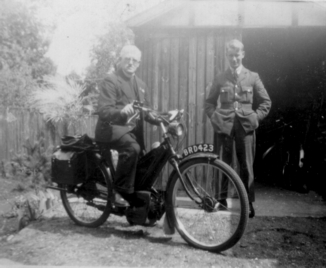
I was released from the R.A.F. in June 1946, having voluntarily extended my service after the war ended. I returned to my job with Reading Corporation Transport, but I could not seem to settle down to the old routine and after about one month I gave in my notice and went to work for the British Broadcasting Corporation at their Monitoring Station at Caversham Park, near Reading, in July 1946, as a Dictation Typist in the Listening Room. This was interesting work and required a high degree of speed and accuracy in typing as well as a knowledge of the spelling of the names of foreign newspapers, places and political personalities. I worked mainly with Polish and Russian Monitors who listened over their headphones to news and political features broadcast in their own language and translated them into English for me to type. To do this I had to keep up with them as they verbally translated, which entailed the instant correct spelling of Polish or Russian place-names, newspapers and political dignitaries and whipping out a completed page from the typewriter and a new one in, when catching up and carrying on with the Monitor continuing to dictate. There were two of us, male dictation typists, and we worked five nights a week from midnight to 8am and from 7pm to 3am on alternate weeks. There were also several female dictation typists who worked on days.
I used to like to go up to the Morse Room sometimes during meal breaks where skilled morse operators transcribed morse transmissions to which they were listening over their headphones and type them on their typewriters. One operator I got to know was able to stop typing, have a few words with me, then catch up from where he had left off, such was his skilled morse operating. I got so used to working at night and sleeping in the day that I found it difficult to sleep on my nights off. One of the busiest nights I had working for the B.B.C. Monitoring Service was in 1947 on the night our first child was born.
After one year working for the B.B.C. I thought I ought to be at home at night, having recently had our first child, so I left and joined the Reading Post Office in July 1947 as a Telegraphist, at least, that's what we were called, although no morse code was involved. The job consisted of accepting telegrams from members of the public over the telephones for transmission by teleprinters and also receiving telegrams from different post office telegraph offices throughout the country for local delivery and for relay to other centres. These came through on a gummed tape which had to be moistened and stuck on telegram forms. Of course we had to be trained in teleprinter operating and for the associated duties of a busy telegraph office. Shift duties, including night duties were involved. Although I quite liked this work, one of the things which went 'against the grain' with me was that we were supervised in the daytime by a group of females - 'old maids', and the head supervisor was a red headed 'old battleaxe!'. If we made a mistake which caused a complaint to be received from a member of the public we received a note from the management, known as a 'skin', demanding an explanation.
While living at Reading, I became a member of 'Reading Temperance Choral Society' in which I sang with the tenors. We performed in competitions about once a year at the Alexander Palace, London. We practised about once a week at the 'Palmers Hall', in west street, Reading, and I could not help noticeing a middle-aged gentleman who always sang with the ladies as he was an alto singer. We also gave concerts mainly in the Reading Methodist Church which used to be in London Street, Reading, when we sang Handel's Messiah, Hayden's Creation and other choral works. I still have a programme of a National Temperance Fete at the Crystal Palace on 15th June 1935. The first choral item was called 'My Pledge' and begins with the words 'I promise to abstain from all intoxicating liquers and beverages'. I don't know what they would say to me now, as since being in the forces during the War I take, in very moderation, all sorts of alcoholics! I played the organ from time to time at my father's Carey Baptist Church. It was a full size pipe organ and I remember playing a sort of 'signature tune' each time; my father did not like it!
A Southern Railway terminus used to be at Reading, and I used to go into the station to see the Southern Railway steam locomotives which came in and went out with the passenger trains. There was also an engine shed near the terminus. All that was done away with and, the Southern Region railway being electrified, the passenger trains now run into a bay in the Western Region station.